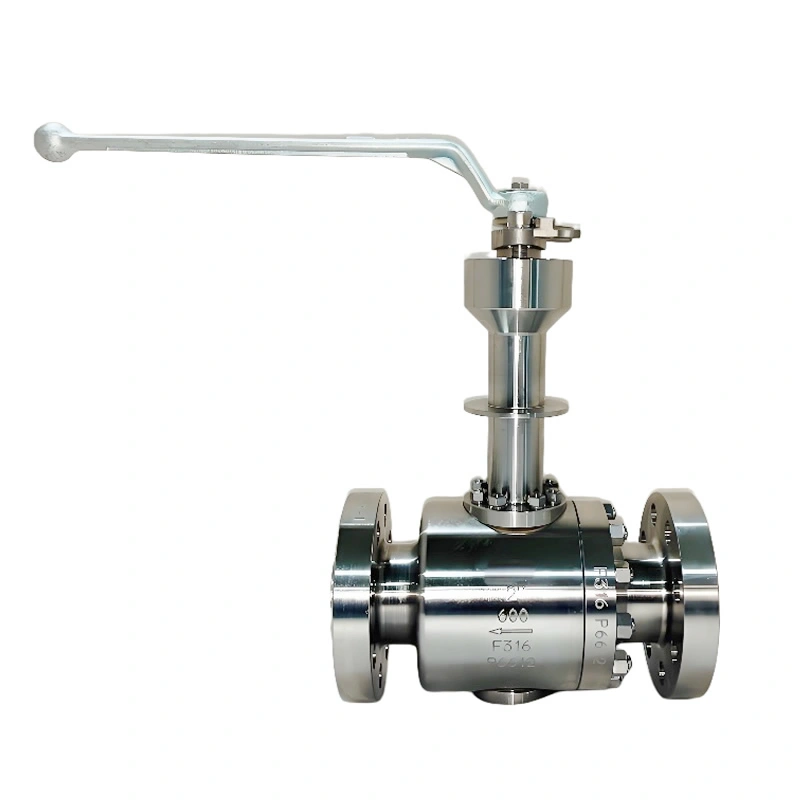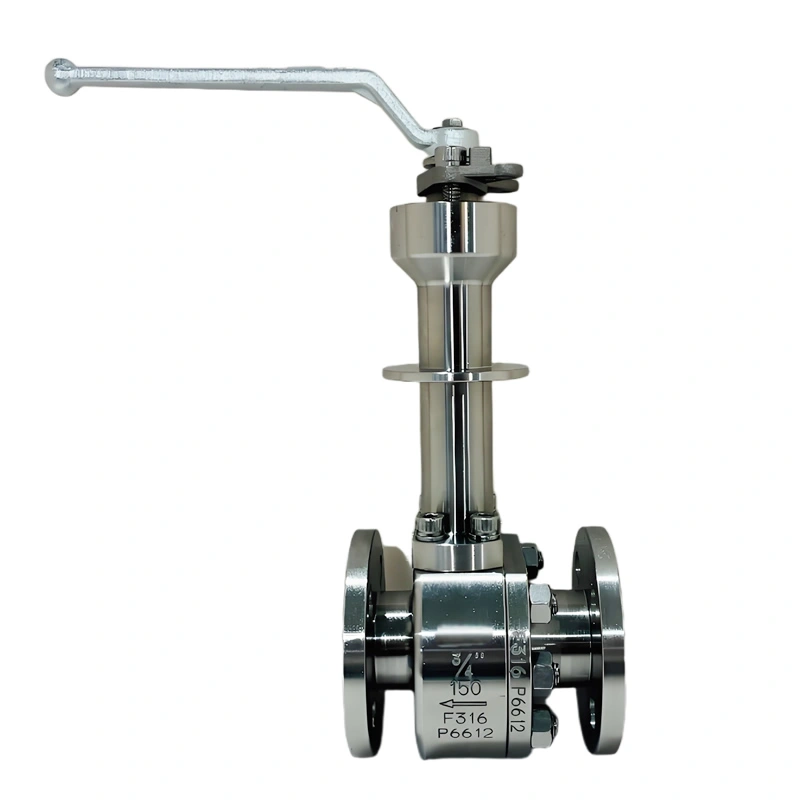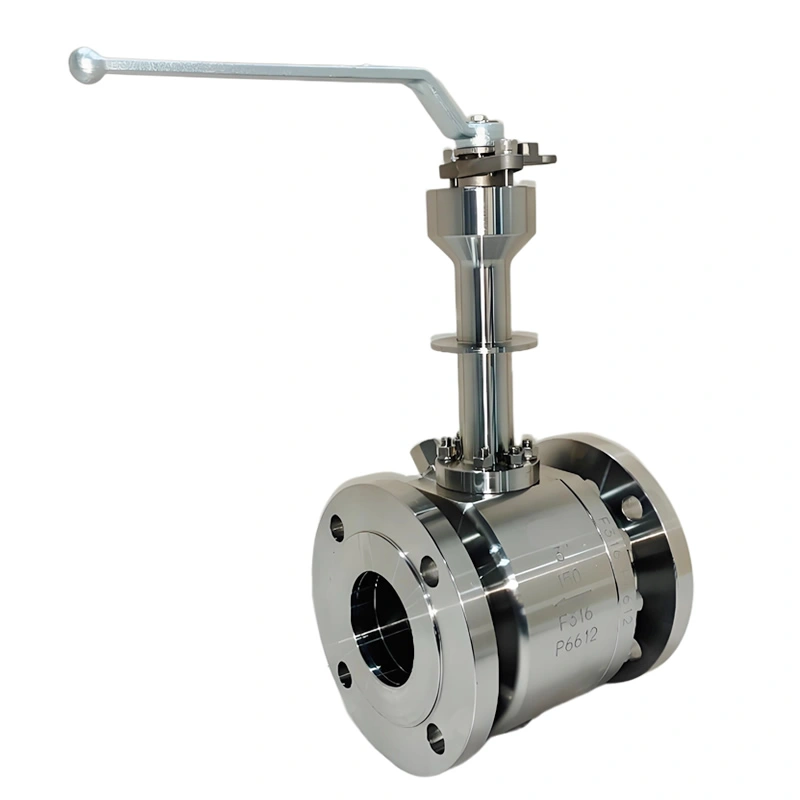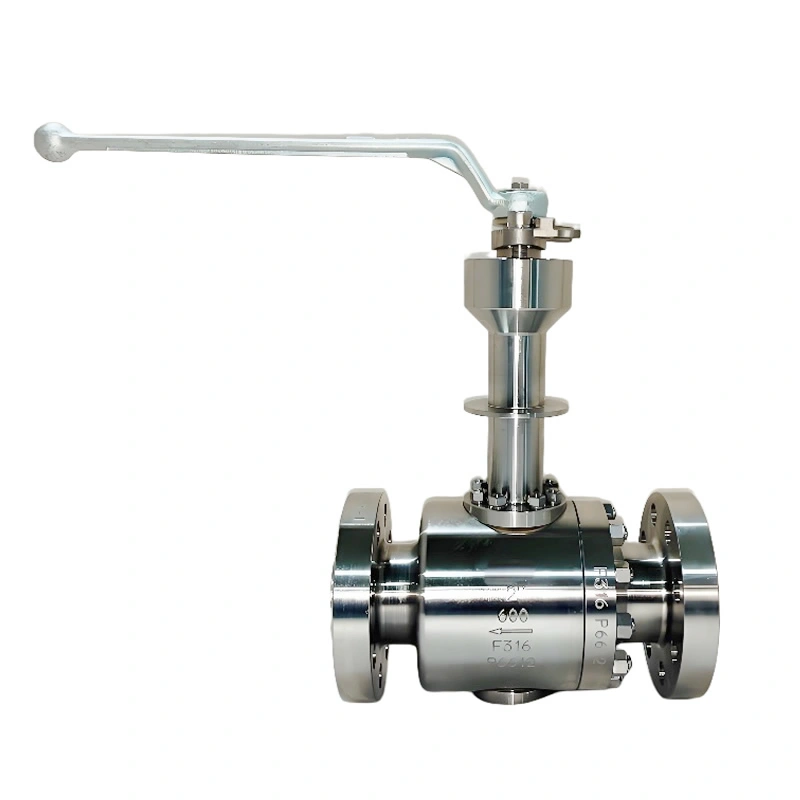- 1/2″ – 12″ (DN15 – DN300)
- Class 150-2500 | -196°C to +450°C
- ASME B16.34, API 6D, ISO 17292
- ASTM A182 F316 (Body/Ball/Stem), Stellite-coated seats
- ANSI/FCI Class V/VI (metal-to-metal)
- Flanged (RF/RTJ), BW/SW
- Manual/Gear/Pneumatic/Electric
- DNV/BV/TÜV, NACE MR0175
Specification
DN50 CLASS 600 F316 Two-Piece Hard-Seal Cryogenic Floating Ball Valve
I. Product Overview
Newway DN50 CLASS 600 F316 two-piece hard-seal cryogenic floating ball valve is engineered for extreme low-temperature service. With a side-entry, two-piece structure and F316 stainless steel construction, it ensures reliable shut-off at -196°C. The hard-seal design and floating ball mechanism deliver tight closure under high pressure, meeting rigorous third-party inspection standards. Ideal for cryogenic fluid handling in LNG, industrial gas, and low-temperature process systems, it combines durability, precision, and safety for critical low-temperature flow control.
II. Key Attribute Parameters
Size & Connection: DN50 (2″) with flanged ends (per ASME B16.5), compatible with standard cryogenic pipeline systems.
Pressure Rating: CLASS 600 (11.0MPa), rated for high-pressure cryogenic service, ensuring stability in LNG transfer, industrial gas pipelines.
Temperature Range: -196°C to +150°C, validated for deep cryogenic to moderate temperature swings, suitable for liquid nitrogen, oxygen, LNG.
Material Composition:
Body & Bonnet: F316 stainless steel (ASTM A182), with high Cr (16 – 18%), Ni (10 – 14%), Mo (2 – 3%) content for corrosion/oxidation resistance in cryogenic environments.
Ball & Seat: Hardened F316 (or alloy-coated) for metal-to-metal sealing; ball surface finish Ra ≤0.8μm, seat tolerance ±0.02mm for tight closure.
Stem: Integral F316 with anti-blowout design, stem packing (PTFE + graphite) resistant to cold-flow and leakage at -196°C.
Design Standards: Complies with API 6D, ASME B16.34; third-party certified (e.g., DNV, BV) for material, performance, safety.
Product Overview
III. Structural Features
Two-Piece Side-Entry Design: Enables easy in-line maintenance—internal components (ball, seat, stem) accessible by removing bonnet bolts, reducing downtime in cryogenic plants.
Floating Ball Mechanism: Ball “floats” on the seat, self-centering under pressure to ensure uniform sealing. Compensates for thermal expansion/contraction in cryogenic cycles, maintaining tightness.
Hard-Seal Technology: Metal-to-metal (or alloy-enhanced) seating resists wear, galling, and low-temperature brittleness. Achieves ANSI/FCI Class V leakage (<0.001% of flow) at -196°C, critical for hazardous cryogens.
Extended Bonnet: Protects stem packing from cryogenic temperatures. Insulated (optional) to prevent frost formation, ensuring smooth operation and packing integrity over cycles.
IV. Manufacturing Processes
Material Prep: F316 forgings undergo ultrasonic/eddy-current testing to eliminate defects. Spectral analysis confirms chemical composition (Cr, Ni, Mo) meets cryogenic service specs.
Precision Machining: CNC turning/milling shapes body, bonnet, and ball to tight tolerances (±0.05mm). Ball/seat surfaces are lapped to Ra ≤0.4μm for hard-seal compatibility.
Hardening & Coating: Ball/seat surfaces are plasma-sprayed with Stellite or similar alloy (hardness ≥55 HRC), then ground to ensure uniform contact and wear resistance.
Cryogenic Testing: Valves undergo -196°C immersion testing (per API 6D) to verify sealing, material ductility. Pressure tests (1.5×CLASS 600) confirm body integrity; leakage tests (0.6MPa He) validate hard-seal performance.




